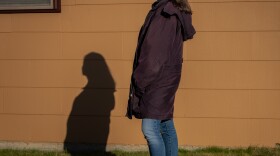
Geoff Brumfiel
Geoff Brumfiel works as a senior editor and correspondent on NPR's science desk. His editing duties include science and space, while his reporting focuses on the intersection of science and national security.
From April of 2016 to September of 2018, Brumfiel served as an editor overseeing basic research and climate science. Prior to that, he worked for three years as a reporter covering physics and space for the network. Brumfiel has carried his microphone into ghost villages created by the Fukushima nuclear accident in Japan. He's tracked the journey of highly enriched uranium as it was shipped out of Poland. For a story on how animals drink, he crouched for over an hour and tried to convince his neighbor's cat to lap a bowl of milk.
Before NPR, Brumfiel was based in London as a senior reporter for Nature Magazine from 2007-2013. There, he covered energy, space, climate, and the physical sciences. From 2002 – 2007, Brumfiel was Nature Magazine's Washington Correspondent.
Brumfiel is the 2013 winner of the Association of British Science Writers award for news reporting on the Fukushima nuclear accident.
-
Conditions at the Zaporizhzhia nuclear plant in Ukraine are deteriorating as international monitors are hoping to visit the facility in the coming days.
-
Sweat is essential to keeping humans cool and comfortable, but some insects also need our sweat to survive.
-
A 75-year-old woman became enmeshed in conspiracy theories about COVID. After she got infected, she rejected effective treatments and sought out black market drugs instead.
-
Scientists have recorded a song coming from a volcano. They think the musical notes may someday be useful for predicting dangerous eruptions. (Story aired on All Things Considered on June 6, 2022.)
-
Scientists have recorded a song coming from a volcano. They think the musical notes may someday be useful for predicting when a dangerous eruption might occur.
-
For decades, U.S. astronauts and Russian cosmonauts have lived side-by-side aboard the International Space Station. Now some are wondering whether that partnership can withstand the war in Ukraine.
-
Stephanie was usually careful about her health and regular vaccinations. But then she got into sharing far-out videos and fringe ideas. When COVID hit, misinformation put her and her husband at risk.
-
Amazon has announced plans to launch thousands of new satellites into orbit over the next five years. Some experts fear that it will overwhelm the world's ability to manage congestion in space.
-
An NPR analysis of security footage and photos following the attack on Europe's largest nuclear power plant shows that many of the plant's critical safety systems were in the field of Russian fire.
-
A torrent of satellite images and cell phone videos are shaping the public's view of the war in Ukraine. The speed and scale at which the information spreads is powerful, but it can also be deceiving.





